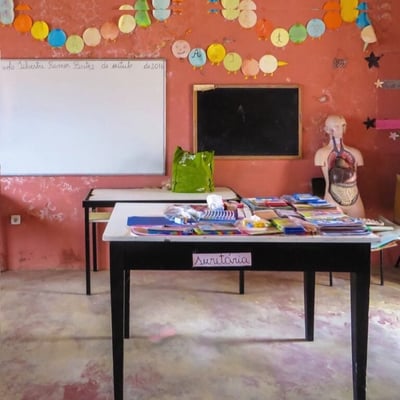1
00:00:02,325 –> 00:00:04,285
Hugo: Tiago, veste-te rápido.
{{Hugo: Tiago, get dressed quickly.}}
2
00:00:04,385 –> 00:00:07,485
Tens de ir para a escola.
{{You have to go to school.}}
3
00:00:07,485 –> 00:00:12,025
Tiago: Eu estou cansado, quero dormir mais…
{{Tiago: I am tired, I want to sleep more…}}
4
00:00:12,065 –> 00:00:14,725
Hugo: Todos os dias a mesma coisa.
{{Hugo: Every day the same thing.}}
5
00:00:14,945 –> 00:00:19,005
Se tu queres dormir mais, podes deitar-te mais cedo.
{{If you want to sleep more, you can go to bed (lie down) earlier.}}
6
00:00:19,305 –> 00:00:22,465
Mas eu não te posso acordar mais tarde.
{{But I can’t wake you up later.}}
7
00:00:22,475 –> 00:00:24,535
Tiago: Podes não me acordar.
{{Tiago: You can’t wake me up.}}
8
00:00:24,535 –> 00:00:26,335
Hugo: Vá, prepara-te.
{{Hugo: Go on, get ready.}}
9
00:00:26,335 –> 00:00:28,755
Eu vou fazer-te o pequeno almoço.
{{I will make you breakfast.}}
10
00:00:28,755 –> 00:00:33,425
Veste-te, come, lava os dentes e vamos.
{{Get dressed, eat, brush your teeth, and let’s go.}}
11
00:00:33,425 –> 00:00:35,445
Tenho de te levar a horas.
{{I have to take you on time.}}
12
00:00:35,445 –> 00:00:37,725
Tiago: Tu levas-me a horas,
{{Tiago: You take me on time,}}
13
00:00:37,725 –> 00:00:41,205
mas depois é a professora que se atrasa.
{{but then it is the teacher who is late.}}
14
00:00:41,205 –> 00:00:45,425
Hugo: Se calhar, ela atrasa-se porque fica presa no trânsito.
{{Hugo: Maybe she’s late because she gets stuck in traffic.}}
15
00:00:45,425 –> 00:00:47,725
Ela já me disse que vive longe.
{{She told me she lives far away.}}
16
00:00:47,845 –> 00:00:52,185
Nós vivemos muito perto da escola, não tens desculpa.
{{We live very close to school, you have no excuse.}}
17
00:00:53,625 –> 00:00:55,685
Tiago: Sinto-me doente…
{{Tiago: I feel sick…}}
18
00:00:55,685 –> 00:00:58,965
Hugo: Sentes-te doente?
{{Hugo: Do you feel sick?}}
19
00:00:58,965 –> 00:01:01,005
Então vamos ao hospital.
{{So let’s go to the hospital.}}
20
00:01:01,005 –> 00:01:04,305
O médico vai chamar-nos quatro horas depois,
{{The doctor will call us four hours later,}}
21
00:01:04,305 –> 00:01:07,685
eu vou dizer-lhe como te sentes e pedir-lhe
{{I will tell him how you feel and ask him}}
22
00:01:07,685 –> 00:01:10,345
para te internar a semana toda.
{{to admit you (hospitalize you) all week.}}
23
00:01:10,345 –> 00:01:13,805
Não vês os teus desenhos animados nem os teus amigos
{{You won’t see your cartoons or your friends}}
24
00:01:13,805 –> 00:01:18,145
e eles podem operar-te e deixar-te com uma cicatriz muito grande
{{and they can operate on you and leave you with a very large scar}}
25
00:01:18,145 –> 00:01:21,924
para o resto da tua vida, mas vais ficar curado.
{{for the rest of your life, but you will be cured.}}
26
00:01:21,925 –> 00:01:24,085
Tiago: Eu estou bem, eu estou bem!
{{Tiago: I am fine, I am fine!}}
27
00:01:24,085 –> 00:01:25,805
Estava a brincar!
{{I was playing!}}
28
00:01:25,805 –> 00:01:26,745
Vou preparar-me!
{{I will get ready!}}
29
00:01:26,755 –> 00:01:28,075
Hugo: Bem me pareceu.
{{Hugo: I thought so.}}
 We respect your privacy and have a ZERO TOLERANCE for spam.
We respect your privacy and have a ZERO TOLERANCE for spam.
















Hi, thanks for the great dialogues.
I don’t quite get why it’s “Ela já me disse que vive longe.” I would have thought that the first half of the sentence is a simple affirmative clause and therefore it would have to be “Ela já disse-me que vive longe.” Is it because of the “já”?
And instead of “Bem me pareceu” I suppose you can also say “Pareceu-me bem”. It’s just a question of emphasis, right? And when the bem is placed first, the clitic also changes. Correct? Is that maybe the case with the first sentence as well. Would it be “Ela disse-me já que vive longe.” Would the sentence change if the já came after the verb?
It would be great if someone could explain this.
Thanks and keep up the great work.
Olá, Miriam, e obrigado pelo comentário!
1) Like you said, it’s the adverb “já” that pulls the clitic pronoun to the proclitic position (before the verb). Certain words have this attractive force and constitute exceptions to the general rule of thumb that simple affirmative clauses = enclitic placement (after the verb). Changing the word order here would make it sound pretty awkward, but your proposed alternative is grammatically correct: Ela disse-me, já, que vive longe.
2) “Bem me pareceu” (I thought so) is an idiom that you can’t flip to “Pareceu-me bem” (It seemed well to me), as they mean different things. But your analysis of both sentences is correct; in the former, “bem” pulls the clitic to the front of the verb, which doesn’t happen in the latter 🙂
Olá Joseph, thanks so much for the detailed explanation. It’s a bit tricky, but I think I get it now and hopefully I’ll get used to it with practice.
How cute Tiago is!!
In the dialogue above, can the sentence “Tu levas-me a horas, mas depois a professora se atrasa.” replace “Tu levas-me a horas, mas depois é a professora que se atrasa.”?
Thanks.
Yes, it can, with one little adjustment: “Tu levas-me a horas, mas depois a professora atrasa-se” 🙂
Hi Team,
The sentence ‘Tenho de te levar a horas.’, what is drawing the clitic ‘te’ before the verb? Can it not also be ‘Tenho de levar-te a horas.’?
Boas Festas a tudo!
Olá, Cameron. The preposition ‘de’ is what attracts the clitic pronoun. In this case, with an infitinive verb, it’s acceptable to place the pronoun on either side of it, so your suggestion is also fine 🙂 Boas Festas! (a/para todos*, não a tudo)
Olá. Porque é que o Hugo diz, “Vá, prepara-te”? Neste caso, parece-me que o Hugo está a usar o formal do imperativo com “Vá” e o informal do imperativo com “prepara-te”. Causa uma confusão para mim. Achei que diria, “Vai, prepara-te” para manter o mesmo tempo verbal pela frase inteira, não é? Obrigado pela ajuda!
Olá, Kyle. Neste contexto, deves interpretar a palavra “Vá” como uma interjeição e não como um verbo 🙂 É como dizer “Okay” ou “All right”. A palavra “Vá” não é dirigida diretamente ao Tiago, mas a palavra “prepara-te” sim. De qualquer forma, também seria aceitável dizer “Vai, prepara-te”.
Faz sentido. Obrigado!
Boa tarde, what draws the “te” before “internar”, in the sentence “eu vou dizer-lhe como te sentes e pedir-lhe para te internar a semana toda.”?
Obrigado!
Olá! The word “para” is the one attracting the pronoun “te” 🙂 Note how “pedir-lhe”, which comes before “para”, follows the default placement because it’s not under another word’s influence.